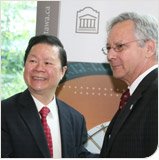In our opinion, this (below) media article shows that law student Paula Frawus has correctly gauged the mind and motives of president Allan Rock and his administration regarding primacy of image over substance:
Sexually explicit song on University of Ottawa law school field trip draws fire -- Ottawa Citizen, march 18, 2014
“It is disappointing that it takes involving the media to get a statement from the administration” Krawus said, adding that the statement is geared toward the media as opposed to the student body.
...
But according to Krawus, the university’s fear of attracting bad publicity trumps a stance against sexist behaviour.
“In failing to apologize in a timely manner, the message (the administration) is sending is: We’re afraid of attracting bad press,” says Krawus, adding that “the message should be: what happened will not be tolerated at school sanctioned events.”
Additionally, our opinion is that rather than asking the institution to impose a "this expression will not be tolerated" stance or rule, the adult law students could have talked it out on the bus ride back from the sugar bush, as a first step. If not sufficient, then the discontent students could search to implement more venues to continue the talking out of the matter, possibly asking for institutional resources in seeking out such venues. The university ombudswoman could be of some assistance here.
If professors or staff were involved, then there is a formal complaint process, which foresees mediation at an early stage.
We fail to see how a knee jerk reaction of calling for immediate institutional reprimand or sanctions, without making a significant effort to communicate in view of improving relations and working out differences, is productive.
Nonetheless, there is hope that Mr. Rock might eventually, with the help of his hand picked rape-culture advisory committee (which excludes all unions and associations of staff and students), come to understand that his primary role should be to enable communication and learning through inter-personal exchanges, rather than to create a facade, and to delay while the media crisis dissipates. (His public relations advisers, hired at corporate rates, regularly give him this advice, as access to information records have shown.)
Or the advisory committee might unfortunately make the usual canned recommendations of more and required classroom training and courses, with just the right "curriculum" and Power Point presentations?
We are in a nasty place when the students themselves ask for institutional controls on thought and expression, rather than primarily dedicate themselves to making the community through rich and intense (also risky) interpersonal exchanges of all sorts. In community, the question and practice of crass or vulgar language needs to be continually discussed and challenged in each of its inter-personal contexts, not regulated from above.
The institution has removed the physical spaces where such exchanges can spontaneously and routinely occur, and regulates posters, classroom access, physical disposition of furniture, etc. There are no true agoras on campus. The institution has segregated students into different programs of study, and created demanding yet sterile curricula. It appears that the institution has succeeded in atomizing us all when students themselves demand more rules that stifle social confrontation and protect individual isolation and group segregation.





No comments:
Post a Comment